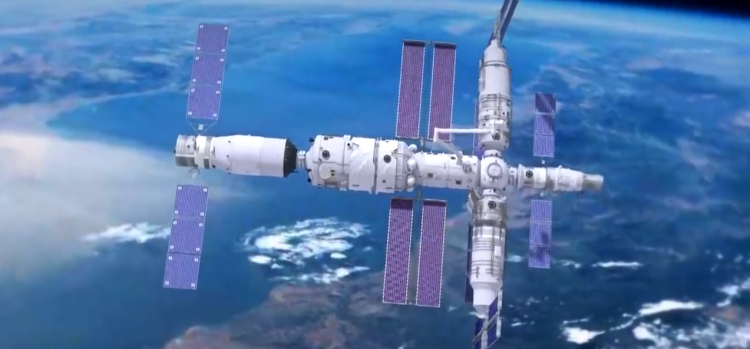On Sunday, China's three-person Shenzhou 14 mission arrived at Tianhe, the core module of the under-construction Tiangong, nearly six hours after taking off from the Gobi Desert's Jiuquan Satellite Launch Center.
The three Shenzhou 14 crewmembers - commander Chen Dong, Liu Yang, and Cai Xuzhe - will spend around six months aboard the Tianhe, which will launch to low Earth orbit in April 2021.
According to Chinese space officials, the three will conduct a variety of scientific research and educational outreach activities while in orbit, as well as execute many spacewalks and install new equipment within and outside Tianhe.
The astronauts will also supervise the launch of Tiangong's other two modules, Wentian ("Quest for the Heavens") and Mengtian ("Dreaming of the Heavens"), in July and October, respectively.
Wentian and Mengtian will connect on either side of Tianhe, forming a T-shaped orbiting station nearly 20% larger than the International Space Station (ISS).
Shenzhou 12 and Shenzhou 13 were the two previous crewed flights to Tianhe, each sending three astronauts to the core module. Shenzhou 12 launched in June 2021 and lasted three months, while Shenzhou 13 launched in October and returned to Earth in mid-April after a six-month mission.
Shenzhou 15 is expected to be released by the end of the year. (It's difficult to say for sure because China doesn't publish many specifics about its space missions until they're ready to take place.) If all goes as planned, Shenzhou 15 will overlap with Shenzhou 14, marking the Tiangong space station's first-ever crew handover.
The launch and arrival of Shenzhou 14 at Tianhe continued a busy 2022 in human spaceflight.
In addition to a space station, Beijing intends to establish a lunar facility, with the National Space Administration aiming to undertake a crewed lunar mission by 2029.
Since 2011, when the U.S. prevented NASA from interacting with China, China has been barred from the ISS.
While China has stated that it does not intend to use its space station for global cooperation on the same scale as the International Space Station, it has stated that it is open to foreign collaboration.
The world's second-largest economy has invested billions in its military-run space program, with the goal of establishing a permanently manned space station by 2022 and eventually transporting humans to the Moon.
The country has made significant progress in catching up to the US and Russia, whose astronauts and cosmonauts have decades of space exploration expertise.
Under Chinese President Xi Jinping, however, the country's preparations for its widely publicized "space dream" have been accelerated.






